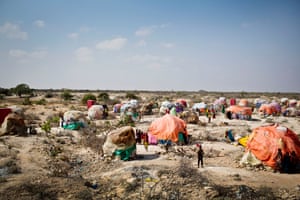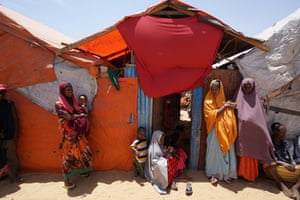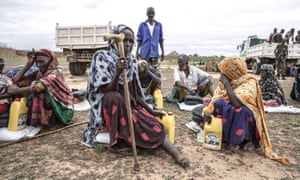Aid efforts to help communities struggling to recover from drought compounded by continuing conflict, aggravated by al-Shabaab
Somalia faces a new humanitarian crisis with more than 2 million people now threatened by severe hunger, aid agencies say.
A further 3 million people are uncertain of their next meal, latest assessments suggest.
The new emergency comes two years after the threat of a major disaster in the unstable east African state was averted by timely aid from the international community.
Experts describe the crisis as a “climate emergency” and say communities are still struggling to recover from the lengthy drought that ended in 2017.
So far donors have promised less than half of the $1bn (£0.8bn) the UN and other agencies say is required.
The average number of people reached with food assistance from
January to May this year was only slightly more than half the total over
the preceding six months, aid officials say, with many agencies forced
to cut back in some areas because the humanitarian appeal for Somalia
was so poorly funded.
Richard Crothers, Somalia Country Director at the International Rescue Committee, said, “The international community must scale up its response … now, or many in Somalia, especially children under five, will die from starvation.”
The crisis has been aggravated by continuing conflict between al-Shabaab, the Islamic extremist movement that has been fighting for more than a decade to impose strict religious rule on Somalia, and government troops, which are backed by regional forces and US air assets.
Sharifo Ali Mohamud, 30, fled her home town in Middle Shabelle, one of the agricultural regions in Somalia worst hit by the drought, in February.
“The drought hit our village. We used to grow maize in the farm but it became dry. We did not have anything to eat. Then the fighting started,” said Mohamud, who travelled for three days with her seven children to reach Mogadishu, the capital.
“Life is very difficult here. We don’t get enough water and food and [if] I return to my village, I am afraid the harsh drought condition will be bitter.”

A further 3 million people are uncertain of their next meal, latest assessments suggest.
The new emergency comes two years after the threat of a major disaster in the unstable east African state was averted by timely aid from the international community.
Experts describe the crisis as a “climate emergency” and say communities are still struggling to recover from the lengthy drought that ended in 2017.
So far donors have promised less than half of the $1bn (£0.8bn) the UN and other agencies say is required.
Richard Crothers, Somalia Country Director at the International Rescue Committee, said, “The international community must scale up its response … now, or many in Somalia, especially children under five, will die from starvation.”
The crisis has been aggravated by continuing conflict between al-Shabaab, the Islamic extremist movement that has been fighting for more than a decade to impose strict religious rule on Somalia, and government troops, which are backed by regional forces and US air assets.
Sharifo Ali Mohamud, 30, fled her home town in Middle Shabelle, one of the agricultural regions in Somalia worst hit by the drought, in February.
“The drought hit our village. We used to grow maize in the farm but it became dry. We did not have anything to eat. Then the fighting started,” said Mohamud, who travelled for three days with her seven children to reach Mogadishu, the capital.
“Life is very difficult here. We don’t get enough water and food and [if] I return to my village, I am afraid the harsh drought condition will be bitter.”

In recent years, the frequency and duration of these dry spells has increased.
The failed rainy season followed abnormally hot and dry conditions since October last year and was partly caused by cyclones in the southern Indian Ocean.
Two-thirds of the country’s population live in rural areas and are completely dependent on the rains for their crops and livestock.
Nur Ali Ibrahim, a 53-year-old farmer and a father of 11 from the Middle Shabelle region, said he had travelled to a displaced camp in Mogadishu’s Abdiaziz neighbourhood because his family could no longer survive when his farm “went dry and no crops grew”.
The area around Ibrahim’s village, about 40km (25 miles) north of Mogadishu, was controlled by al-Shabaab, making it difficult for humanitarian organisations to deliver aid there.
Kenya is urging the UN to list al-Shabaab under the same sanctions as al-Qaida and Islamic State, but foreign donors say the move could stop aid reaching millions.
The proposed listing could take effect as soon as Thursday and could mean organisations that have any interaction with the extremists will face serious penalties.
“A measure like this will have the effect of criminalising humanitarian aid,” said Eric Schwartz, president of Refugees International. “Any measure that would impact the current provision of aid would have extremely serious and substantial implications.”
Al-Shabaab is already targeted under broader sanctions imposed by the UN on Somalia, which is heavily aid-dependent after three decades of conflict and economic ruin.
Currently UN agencies and humanitarian organisations are exempt from these sanctions, which enables them to deliver urgent aid without prosecution when they venture into territory controlled by al-Shabaab.
The Islamist insurgency group, which is affiliated with al-Qaida, has long tried to regulate the distribution of humanitarian aid in the areas it controls, often seeking to levy taxes on NGOs.
Ibrahim said food aid did not reach his village because al-Shabaab demanded money from the organisations who wanted to deliver it.
“Some of the NGO workers were arrested by al-Shabaab. People told us if you stay here then no food aid will come because of al-Shabaab,” he said.

More than half a million displaced people are now estimated to be in Mogadishu, according to Somalia’s National Commission for Refugees and Internally Displaced Persons (NCRI).
“We are worried the situation will be much worse if the coordination between the local governments and the aid organisations is not scaled up in the coming few months,” said Nuro Ismail, aid coordination officer at NCRI.
Muhubo Aden, 41, left Wanlaweyn, 90km from the capital, when all her livestock died.
“After all our animals perished, we had nothing to eat and we ran out of money. Then our neighbour told us [to] go to Mogadishu to get food aid. My sister was very sick and weak due to malnutrition. We left Wanlaweyn in the morning but her ailment worsened and she died,” Aden said.
“If I could get my cows back, I would not have stayed here in the camp. I wish I could earn my life as a herder instead of staying in the IDP camp hopelessly and getting nothing.”


No comments:
Post a Comment